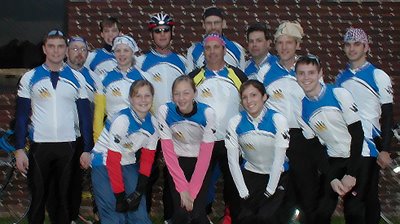I don't know where I journaled in '04; maybe I'll find it. (In this and the last post, square brackets are editorial additions at the time of posting.) Here are my reflections from last year:
11 pm
A few “eternity” thoughts struck me tonight, along with a few “Body of Christ” thoughts:
- Jesus girds “his Body” with a towel, and washes the disciples’ feet. “If We Are the Body,” then of course Jesus girds
us with the towel as we serve in his name [as he serves through us]. He
girds himself, not he girt himself [i.e. in the past], for we are eternal!
- “If We Are the Body,” then it is we ourselves we offer to the Father on the altar, not only the historical Christ or the glorified Christ. “We pray that your angel may take this offering to your altar in heaven,” take
us there, in our brokenness, and transform
us, so that “as we receive from this altar your sacred Body and Blood”
we are transformed more fully into the Body [thanks, Fr. Paul and Fr. Dave!]. The offering we must ultimately make is to not hold back any part of ourselves, and we aren’t there yet, but as Grace more and more transforms us, we are more and more able to offer Christ
in us to the Father.
4:50 am
“Come, let us worship Christ, the Son of God, who redeemed (redeems) us with (by) his blood.” – response to Invitatory Psalm
O precious Blood, spilled for me.
I put you to death, O Lord. It is
I who betray you, who abandon (run from) you, who imprison you, who try you, who condemn
(condemn!? How dare I? Nonetheless, it is so.) you, who beat you, who spit upon you, who whips you, who crowns you with thorns, who mocks you, who forces you to carry the cross, who treats you and your clothing as sport, who washes my hands of you, who seeks to be merely entertained by you (
a la Herod), who cries out against you, who taunts you. All this though under rightful condemnation for my own wrongdoing, who runs from you, who sleeps rather than watch . . .
[Despite this undeniable truth of my sinfulness . . . ] Yet also, this day, if you’ll allow it, Lord, I will: become You, wrapped in a towel washing feet – or serving in the most humble way in our day; watch and pray; keep you company as closely as possible (
a la Mary); follow you along your way; carry the cross with you; weep for your broken, abused Body [in the world today] and do all I can to comfort you; wipe your bloody, bruised face; offer you a moment’s relief from your thirst; watch you nailed, call out for your mercy, and offer it; thirst in your broken Body; accept the care of your beloved ones, and the responsibility for caring. I will, by your grace this day, be faithful, as you live in me and your Spirit transforms me. I will offer forgiveness and receive it. I will drink the cup set before me, knowing that the Father’s perfect will brings Resurrection forth from each moment of death.
“Come, let us worship Christ, the Son of God, who redeems us by his blood!”
“Come, let us sing to the Lord, and shout with joy to the Rock who saves us.”
Ps 95 takes on new meaning in the context of this day [extensive reflections on Ps95 have preceded and followed this in my journaling as I pray it so often; I will probably post these separately], and Good Friday is reflected in this psalm. This is a difficult day, Lord, for us far less than for you because we experience it in the eternity you have purchased for us, so we can rejoice that you are redeeming us by your hellish trial. Come, let us sing of your [unfathomable!]
love! This is how you save us! However else we are delivered in [and through] this life’s circumstances, it is always primarily by your cross.
“Let us approach him with thanksgiving, and sing joyful songs to the Lord.”
We are alive only because of your death and subsequent resurrection, Lord. Too often we stay far off from you, even in the joyfulness. How much less [often do] we draw near. You call us (
me!)to be near in your ghastly brokenness, to see your broken Body and respond to it, to recognize your Body in the brokenness of those around me, and to draw near to it/you with thanksgiving (what less could I feel for all you have done?). Let us/me sing joyfully over your sacrifice, and let me see that it is the same Body that hung on the cross which you serve through me in the 21st century, in the sick, the homeless, the addicted, the broken, the abused
and the abusive, the terrorizer. Let me approach you in them, upon your cross, with thanksgiving and a joyful song.
“The Lord is God, the might God . . . the dry land, too, for it was formed by his hands.”
You who made the entire world, Lord, allowed the world to condemn, abuse, and kill you. What unfathomable humility! What a wonder, that all-powerful You made yourself subject to our whims. [This demonstrates the degree to which] You create us with free will. In thus creating us, you accept death at our hands [through which you free us from death]!
What love, Lord, that you created us anyway [
in spite of this]! Then died for us.
“Come then, let us bow down and worship, . . . for he is our God, and we are the people he shepherds, the flock he guides.”
We put our Creator to death. Only you could allow it, Lord. And this is how you shepherd and guide us. “The Good Shepherd lays down his life for his sheep,” [you tell us]. “Come, let us worship” we will echo again in the liturgy of this day [as the wood of the cross is exposed].
“Today, listen to the voice of the Lord. Do not grow stubborn . . . They shall not enter into my rest.”
For us, Calvary is our Meribah and Massah. Every time we harden out hearts against you, Lord, it is at Calvary. We challenge and provoke you, and in response you die for us. But woe be unto us if we remain hard-hearted, having seen you on the cross for us. We refuse your rest when we do so.
“I confess that I am guilty, and my sin fills me with dismay.” – Ps 38
Your sacrifice is greater than my sins have been, O Lord. Gazing upon you as you are beaten and whipped, buffeted and scorned, spat upon and pierced for me, I know that I have done this to you, for “my sin fills me with dismay.” But “If We Are the Body,” our sin had this effect on you but
has the same effect on us, only you bore it in full to deliver us from it.
Heb 9, 11-25
[I just grasped the link between the concept of a] “Testament” and the death of the testator! If we are to be your Testament, Lord, we must die with you to ourselves.
St. John Chrysostom
This reading just blows me away [each year]. It draws me into you, Lord.
What business does the Body of Christ have
refusing to be imprisoned, beaten, spat upon, and put to death? It is our great privilege to suffer with Christ, to be rejected with him [
for the sake of those rejecting him, as we ourselves have indeed done].
 Merry Christmas!
Merry Christmas!


